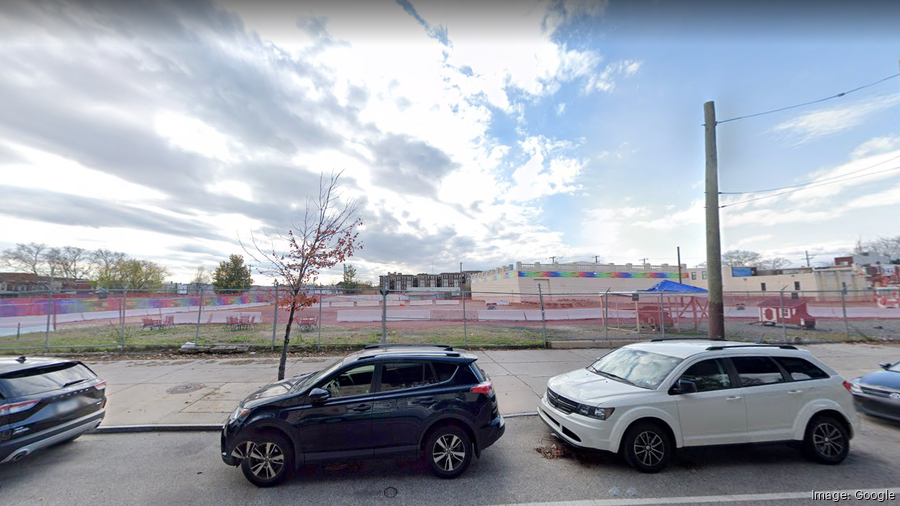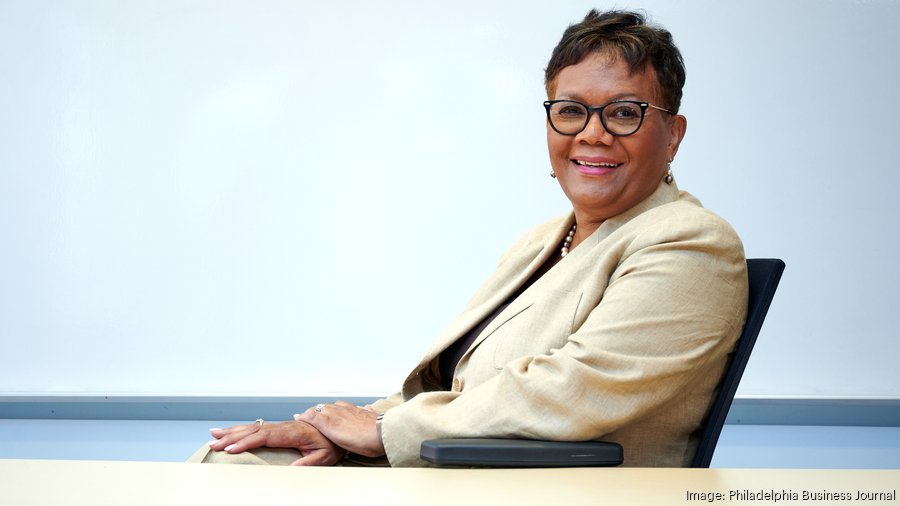Listen to this article 4 min
The Enterprise Center has paid $12.5 million for a stretch of land it will look to develop in West Philadelphia, part of a broader effort by the nonprofit aimed at revitalizing the area in and around the 52nd Street commercial spine.
The 2.9-acre parcel is on the south side of Market Street from the corner of 46th Street to the Community College of Philadelphia’s new building at the corner of 48th Street. Enterprise Center CEO Della Clark didn’t want to get specific on details as a master plan is still being drawn up for the project but said to expect “something very transformative” on the site.

Clark said the Enterprise Center, a community development financial institution (CDFI) based in West Philadelphia, would like to deploy a similar strategy for the site that is being used nearby along 52nd Street, where the organization is looking to fund a $125 million plan to revitalize the commercial corridor.
At an event on Oct. 8, the Enterprise Center hosted 60 business, civic and political leaders for a tour of the 52nd Street corridor, as it seeks money to complete a new vision for that section of the city. The guest list included Pennsylvania Secretary of Banking and Securities Richard Vague, City Councilwoman Jamie Gauthier, State Rep. Rick Krajewski (D-188th), State Sen. Anthony H. Williams (D-8th) and representatives from Wells Fargo, TD Bank and Republic Bank.
SEPTA lent the Enterprise Center a bus to tour the area. Enterprise Center leaders showed them a Power Point presentation that the Enterprise Center and its partner, Nowak Metro Finance Lab at Drexel University, called the 52nd Street Investment Playbook. The idea was to show those stakeholders what opportunities exist to realize economic and social returns in the main business hub in West Philadelphia.
It focuses on the six blocks from Malcolm X Park to Arch Street, a stretch of 138 businesses that generate $98 million in annual sales. The presentation noted that the playbook is part of a national trend of cities raising money for similar projects in urban areas. For example, projects in Buffalo are looking to raise $180 million, $112 million in Detroit and $38.5 million in Charlotte. The presentation added that there are several federal programs such as the American Rescue Plan that provide opportunity for place-based initiatives like the one in Philadelphia.
Clark said response for the presentation was good. She said Wells Fargo and Chase Bank, which is opening a branch on 52nd Street, have been supportive. So have Congressman Dwight Evans, State Sen. Vincent Hughes and city officials. Clark has a distinct vision for the project.
“What we want it to be all locally owned businesses,” Clark said. “We want to break it into primarily three areas — arts and culture, personal services and then we want to have retail. But we want all of this to be complementary and we want to create open space to revitalize it so that it's clean and safe.”
For Clark, her chief focus over the last week has been wooing investors for the 52nd Street project. As Philadelphia recovers from the pandemic, their presentation shows that the University City market, led by Drexel and University of Pennsylvania, continues to grow faster than other areas of the city. And without intervention, economic development could bypass this area of West Philadelphia — which has seen a boon in housing but not business development.
As that happens, it cited four distinct benefits to investing in the project: a strong local intermediary in the Enterprise Center, cultural and commercial assets, the busy 52nd Street SEPTA station and proximity to anchors such as Penn, Drexel and Children’s Hospital of Philadelphia.
The Enterprise Center said it wants to use the project to increase the percentage of Black-owned businesses on the corridor. Black people make up 77% of that area’s population but only own 10% of the businesses there. The corridor is also plagued with high levels of gun violence, low utilization of local businesses by those nearby anchors, residents earning 74% of the city’s median income and an overabundance of discount stores, according to the Enterprise Center.
The Enterprise Center and Nowak have come up with five strategies to combat those trends:
- Acquire a cluster of properties and develop them into projects that signal to the market equitable economic development.
- Support minority startup activity to serve the community’s unmet needs.
- Create a sustainable and connected platform for equitable growth.
- Expand opportunities and improve outcomes for all residents.
- Help residents become homeowners and mitigate displacement.
The Enterprise Center already owns three of the five anchor properties for the project near the SEPTA station — 277 Community and Business Resource Center, 5241-43 Market St. and 24 S. 52nd St.. It still is looking to buy Marketplace 52 and The Parke Building.
The organization said it would cost about $125 million for acquisition and redevelopment of the five anchor properties with potential capital sources including investor equity, bank and concessionary debt as well as city, state and philanthropic grants.
The Enterprise Center already paid a little more than $3.5 millionfor the three properties it owns on 52nd Street and said it plans to pay $51.4 million for the other two buildings. It has raised just $7.5 million for purchase and fit outs of the three buildings already acquired and is seeking the remaining funds through debt, public and foundation grants and tax credit-supported equity. It proposed a $15 million catalyst fund to kick off redevelopment of the properties, which would employ minority contractors.
Clark doesn’t want big box retailers, which she said come and go. Fast-food chains are also not on the preferred list.
“We want these people to be able to walk just like they do in Northern Liberties and have dinner,” she said. “But right now, there's not many sit-down places on 52nd Street.”
Clark also doesn’t want a supermarket chain but rather smaller retailers that sell fresh produce and other healthy foods. She cited urban areas in New York that have smaller markets that sell fruit, vegetables, meat and poultry.
“Smaller gives you the personal feel of the local retailer,” Clark said. “He gets to know the neighbors’ names. He gets them the right-sized turkey. We're looking for retail that provides social cohesion and an experience. Because that begins to change the mindset.”
She would like to do the same thing at 46th Street. Asked what would be considered transformative for that neighborhood, Clark said for one thing, new construction because much of the acquired land has sat vacant for about 30 years — not producing jobs and serving as an eyesore. Several buildings will need to be demolished. Clark said the master plan should be completed by year’s end and the hope is to break ground within 18 months. And like the one at 52nd Street, the Enterprise Center said the 46th Street project will use minority-owned development and construction firms.
Clark didn't want to get too specific but like 52nd Street, she said the neighborhood surrounding 46th and Market streets could use somewhere for residents to buy fresh, healthy food.
“There's a lot of apartment buildings on the drawing board for this area,” Clark said. “So we need more food. We think the area needs an employer to come and we are working on trying to attract an employer to the area that could bring jobs. We're not affordable housing developers. We are about entrepreneurship and small business. And and so we're trying to put together that right now. We have a team of people that's working with us.”





